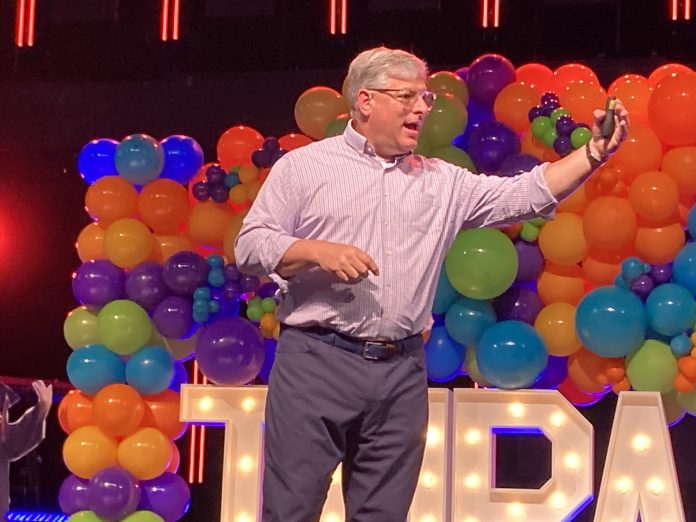
Keeping an eye on your goals and asking for help along the way is key to growing and continuing to be successful, according to Peter Gorman, President and CEO of Peter Gorman Leadership Associates.
Gorman was one of the speakers for the last day of Ector County ISD’s Leadership University Thursday at Crossroads Fellowship.
Leadership University was a three-day professional development event for assistant principals, principals, executive directors of leadership, associate and assistant superintendents and executive directors.
Gorman talked to attendees Thursday about leadership, career mapping and taking responsibility to “grow your knowledge, being fearless about admitting to others that you have areas to grow, and putting a plan together to be intentional about your growth.
“This is about you having an impact on others. By deciding that … I can’t have an impact on others until I have an impact on myself. It’s based on this concept: In life, there are drivers, and there are passengers. If you want to be a passenger, you lose the ability to not be happy with where you end up because you let someone else drive,” Gorman said.
He added that he decided a long time ago that he was going to be a driver.
Gorman spoke about career mapping and figuring out from/to statements.
Gorman said 70% of your growth comes from your experiences; 20 percent comes from interaction with others; and 10 percent comes from formal education.
“Here’s the challenge: Formal education is exceptionally important, but it largely occurs in a laboratory — a sterile laboratory. You work in some of the least sterile environments known to man. You have no control over kids. Do they sleep last night? Have a good meal? Are they having trouble at home? Middle school angst?” Gorman said.
“The idea of career mapping is all designed around one concept and that is from/to statements. This is where you decide if you’re going to drive. Are you happy where you are? Or are you happy where you are and you know you can improve?” Gorman added.
Gorman also spoke about the Dunning Kruger Effect, a type of cognitive bias where people are unaware of their true abilities and they think they’re smarter or more capable than they really are.
Social psychologist David Dunning wrote that in many cases, incompetence does not leave people disoriented, perplexed or cautious.
“Instead, the incompetent are often blessed with an inappropriate confidence, buoyed by something that feels to them like knowledge,” Gorman said.
“You’ve got blind spots, just like I have blind spots. I work in any environment where I do a lot of presentations and sometimes I do them in places where I get videotaped. I love when they do that because I sit down with people who helped coach me and we watch that. They point out painful moments sometimes. I have to understand that because I enjoy presenting,” he added.
Maribel Aranda, former principal of Crockett Middle School and now director of administrative services, said educators always have a goal and they have to plan to reach that goal.
She added that people have strengths and weaknesses.
“If we have those weaknesses, how can we get better with those and overcome those, or make yourself better,” Aranda said.
Susan Hendricks, ECISD director of leadership, said they have never arrived at their destination.
“We always have room to grow. We’re never there yet and finding that person that helps us get to that next level” is important, Hendricks said.
Jaime Miller, executive director of talent development, said Leadership University has been a wonderful experience.
“We’ve had a lot of great feedback. We’re very appreciative that we’ve had sponsors that have helped us to have snacks, to have drinks, to have lunch, and then all of our presenters have been amazing keeping our leaders engaged and just helping them to become their best selves,” Miller said.
She said there were about 50 different sessions.
“We did a survey at the end of last year and asked leaders what they are interested in and what they feel that they need to help fill gaps … A lot of these are things that they told us that they would like to see at Leadership University,” Miller said.
She added that they review things as needed.
“We have a district leadership team meeting, which is once a month, and sometimes we do go in and we revisit items that have been in Leadership University just to refresh, to see where people are, and then to see our needs as we go forward,” Miller said.
It takes about three months to plan a Leadership University.
“We are new to our roles so it does … (take) a couple of months to ensure that we have our speakers, that we’re giving a lot of choices of what people do want to learn and what they want to take back to their departments or campuses,” Miller said.



